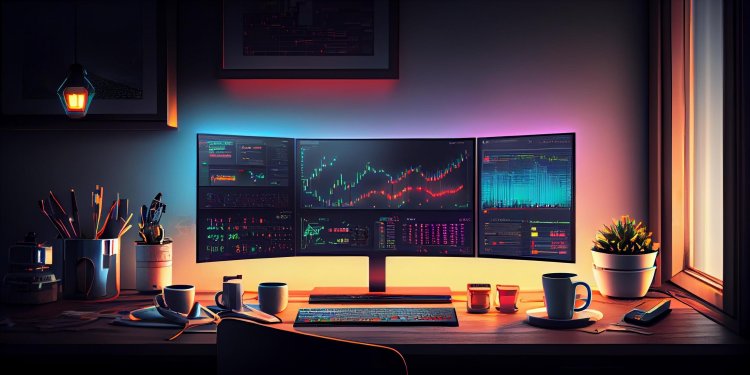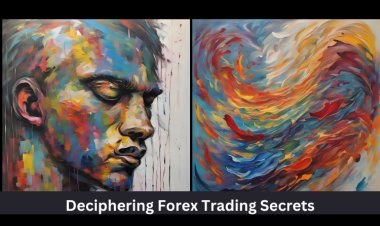A Comprehensive Guide to Forex Trading
The buying and selling of currencies is known as Forex trading, FX trading, or just currency trading. Every day, billions of dollars are traded, making this market the biggest and most liquid in the world. In this in-depth tutorial, we'll explore the realm of foreign exchange trading and examine its many facets, from the basics of how it operates to the advice and opinions of industry professionals. So let's plunge in and experience the thrilling world of FX trading.

A Comprehensive Guide to Forex Trading
Forex trading, also known as foreign exchange trading or FX trading, is the buying and selling of currencies. It is the largest and most liquid market in the world, with trillions of dollars traded every day. In this comprehensive guide, we will delve into the world of forex trading, covering everything from what it is and how it works, to its pros and cons, and providing expert advice and opinions. So, let's dive in and explore the exciting world of forex trading.
An Overview of Forex Trading
Forex trading is done on a decentralised network of electronic marketplaces, where traders can buy and sell currencies from all over the world. A currency's price is based on supply and demand, and it can change quickly in response to news events, economic data, and other factors. This makes foreign exchange trading a highly dynamic and fast-paced market, offering opportunities for both short-term and long-term traders.
Who is forex trading for?
Forex trading is suitable for anyone interested in investing in and trading in the financial markets. It is a popular choice among individuals, institutions, and corporations looking to diversify their investment portfolios and potentially earn profits through currency fluctuations. With the rise of online trading platforms, forex trading has become more accessible to retail traders, making it an attractive option for those looking to enter the world of trading.
Who Will Use Forex Trading?
A wide range of participants use forex trading, including banks, hedge funds, multinational corporations, individual traders, and even governments. These participants use forex trading for various purposes, such as hedging against currency risk, speculating on currency movements, and facilitating international trade and investments.
What is forex trading?
Forex is an acronym for foreign exchange. As mentioned earlier, this is the market where currencies are traded. The forex market is open 24 hours a day, five days a week, allowing traders to buy and sell currencies at any time. The currencies are traded in pairs, such as EUR/USD (euro/US dollar) or USD/JPY (US dollar/Japanese yen). This is because in forex trading, you are always buying one currency and selling another.
Where does forex trading take place?
Forex trading takes place on a global scale, with major financial centres around the world serving as hubs for trading activities. These include New York, London, Tokyo, and Sydney. However, with the advancement of technology, most forex trading now takes place online through electronic trading platforms, making it accessible to traders from all over the world.
When can you trade forex?
As mentioned earlier, the forex market is open 24 hours a day, five days a week. This means that trading can take place at any time, depending on your preferred trading session. The three main trading sessions are the Asian, European, and North American sessions, which overlap at certain times, providing ample opportunities for traders to enter and exit trades.
How to Use Forex Trading
Now that we have covered the basics of forex trading, let's dive into how you can actually start trading. Here are the steps to follow:
1. Choose a reputable broker: The first step is to choose a reliable and regulated forex broker that offers competitive spreads, user-friendly trading platforms, and a variety of trading tools and resources.
2. Educate yourself: Before diving into live trading, it is essential to educate yourself about the forex market, its dynamics, and various trading strategies. This will help you make informed trading decisions and minimize risks.
3. Open a demo account: Most brokers offer Forex demo accounts that allow you to practice trading with virtual funds. This is an excellent way to get familiar with the trading platform and test out your strategies without risking real money.
4. Develop a trading plan: A trading plan is a set of rules and guidelines that you will follow while trading. It should include your risk management strategy, entry and exit points, and the types of trades you will take.
5. Start with small positions: When starting, it is advisable to start with small positions and gradually increase your position size as you gain experience and confidence in your trading abilities.
6. Monitor the markets: Keep an eye on economic news and events that can impact currency prices. This will help you make more informed trading decisions.
7. Practice proper risk management: Risk management is crucial in forex trading. Always use stop-loss orders to limit potential losses and never risk more than 1-2% of your account balance on a single trade.
Pros and Cons of Forex Trading
Like any other form of trading or investment, forex trading has its own set of pros and cons. Let's take a look at some of them:
Pros:
- High liquidity: With trillions of dollars traded daily, the forex market is highly liquid, meaning you can easily enter and exit trades without worrying about market manipulation.
- Accessibility: As mentioned earlier, forex trading is now accessible to retail traders through online platforms, making it easier for anyone to start trading.
- Potential for high returns: Due to the high volatility in the forex market, there is potential for high returns, especially for short-term traders.
- Diversification: Forex trading allows you to diversify your investment portfolio by adding a different asset class to your existing investments.
Cons:
- High risk: With high volatility comes high risk. The forex market is highly unpredictable, and traders can lose money just as quickly as they can make it.
- Complex market: The forex market is complex, and it takes time and effort to understand its dynamics and develop profitable trading strategies.
- Requires discipline: Successful forex trading requires discipline and emotional control. Traders must stick to their trading plan and not let emotions dictate their trading decisions.
Expert Advice and Opinions on Forex Trading
To provide a well-rounded guide to forex trading, we have gathered expert advice and opinions from experienced traders and industry professionals. Here's what they have to say:
"Always start with a demo account and practice until you are consistently profitable before moving on to live trading." Rajavelu, Professional Trader
"Risk management is key in forex trading. Always use stop-loss orders and never risk more than 1-2% of your account balance on a single trade." Shiva, Financial Advisor
"Don't let emotions drive your trading decisions. Stick to your trading plan and be disciplined in your approach." Mark Johnson, Fund Manager
Examples of Successful Forex Trading Strategies
There are various trading strategies that traders can use in the forex market. Here are three examples of successful strategies:
1. Trend following: This strategy involves identifying a trend in the market and entering trades in the direction of that trend. Traders can use technical indicators, such as moving averages, to identify trends.
2. Breakout trading: This strategy involves entering trades when the price breaks out of a key support or resistance level. Traders can use chart patterns and technical indicators to identify potential breakout opportunities.
3. News trading: This strategy involves taking advantage of market volatility caused by economic news releases. Traders can use an economic calendar to keep track of upcoming news events and enter trades based on the expected impact on currency prices.
Comparing Forex Trading with Other Markets
Forex trading is often compared to other financial markets, such as stocks, commodities, and cryptocurrencies. Let's take a look at how it differs from these markets:
|
Market |
Forex Trading |
Stocks |
Commodities |
Cryptocurrencies |
|
Liquidity |
Highly liquid with trillions of dollars traded daily |
Less liquid compared to forex |
Varies depending on the commodity |
Highly volatile and liquid |
|
Trading Hours |
24 hours a day, 5 days a week |
Limited trading hours |
Limited trading hours |
24/7 trading |
|
Leverage |
High leverage available, up to 1:500 |
Lower leverage, usually up to 1:10 |
Varies depending on the commodity |
High leverage available, up to 1:100 |
|
Market Dynamics |
Affected by economic news and events |
Affected by company performance and news |
Affected by supply and demand |
Highly volatile and affected by market sentiment |
The Cost of Forex Trading
Forex trading involves various costs that traders should be aware of. These include:
- Spread: This is the difference between the buy and sell price of a currency pair. It is how brokers make money in forex trading.
- Commission: Some brokers charge a commission for each trade executed. This is usually a fixed amount per lot traded.
- Overnight fees: If you hold a position overnight, you may be charged or receive interest depending on the currency pair's interest rate differential.
- Slippage: This refers to the difference between the expected price of a trade and the actual price at which it is executed. It can occur during times of high volatility or low liquidity.
5 FAQs About Forex Trading
1. Is forex trading risky?
Yes, forex trading is considered a high-risk investment due to its volatility and unpredictability. However, with proper risk management and education, traders can minimize their risks.
1. How much money do I need to start trading forex?
The amount of money needed to start trading forex varies depending on the broker and the type of account you open. Some brokers offer micro accounts with a minimum deposit of $10, while others require a minimum deposit of $100 or more.
1. Can I make a living from forex trading?
Yes, it is possible to make a living from forex trading. However, it takes time, effort, and discipline to become a consistently profitable trader.
1. Do I need to be an expert in economics to trade forex?
No, you do not need to be an expert in economics to trade forex. However, having a basic understanding of economic news and events can help you make more informed trading decisions.
1. Can I trade forex on my mobile phone?
Yes, most brokers offer mobile trading platforms that allow you to trade forex on your smartphone or tablet.
Conclusion
Forex trading offers a world of opportunities for traders looking to diversify their investments and potentially earn profits through currency fluctuations. It is a highly dynamic and fast-paced market, but with proper education, risk management, and discipline, anyone can become a successful forex trader. We hope this comprehensive guide has provided you with valuable insights into the world of forex trading and helped you understand its dynamics and potential risks and rewards. Happy trading!
If you choose to be a self-employed retail trader, here are a few things we offer:
- The best trading platform
- No Requotes
- Lowest Spreads
- High-level liquidity
- Interbank connectivity
- Pure STP/DMA/ECN
- Free signals
- Best support
- Crypto Wallet and withdrawals / Deposits (USDT)
- Robust CRM
- TradeFxP wallet
- Once click withdrawal
- Multiple payment options
- Local offices to walk in
- Free VPS
- Free Video Chat / Virtual Meetings
- And many more…
If you choose to be a part of our managed account programme,
- All of the above +
- 1-2% Daily Profits
- High-level risk management
- Capital protection
- Only 30% of the capital used
- Negative balance protection
- Our fee is from the profits only
- Monthly profit withdrawal
- Wallet system – Use it like Phonepe, or Google Pay
- Crypto wallet and withdrawals / Deposits (USDT)
- Live monitoring
- MyFxbook Live monitoring
- Copy Trading
- And many more…
Optional: If you do not withdraw your profits for 2 months, our system will use those profits to trade and will keep your 100% capital safe and secure for margin purposes. This is optional, and if you choose not to be a part of it, you can withdraw your profits from the first month itself.
Why 1-2% daily? Can't your managed forex account earn more?
Yes, we can! Remember: greed may be good in the beginning, but in the end, it will destroy everything. You and I know that! Many droplets make an ocean! Join the Managed Account Programme and sit back for six months, then look at your account. You'll see that our strategy is good and the best. Do you know what I mean?
If you choose to be a part of us as an introducing broker (IB) or channel partner,
- Industry-best rebates
- Local Office support
- Staff support
- Marketing support
- Marketing materials
- And many more…
Having said that,
You can join our Forex Managed Account programme and earn 1-2% profits daily. See for yourself by clicking the below link.
Have a great journey, and may you catch some big waves on your way to prosperity!
To see Ai Forex Trading for real, use these credentials.
- Low-risk strategy:
- Mt4: 112018
- Pw: Allah@101
- Server: TradeFxP live,
1. To read why you should be with us, click here.
2. To open an account, click here.
3. To see our regulation certificate, click here.
4. To see our news with the IFMRRC, click here.
5. For claims, click here.
6. For the main site, click here.
7. For blogs and articles, click here.
8. Main Website: www.TradeFxP.com



 admin
admin 










